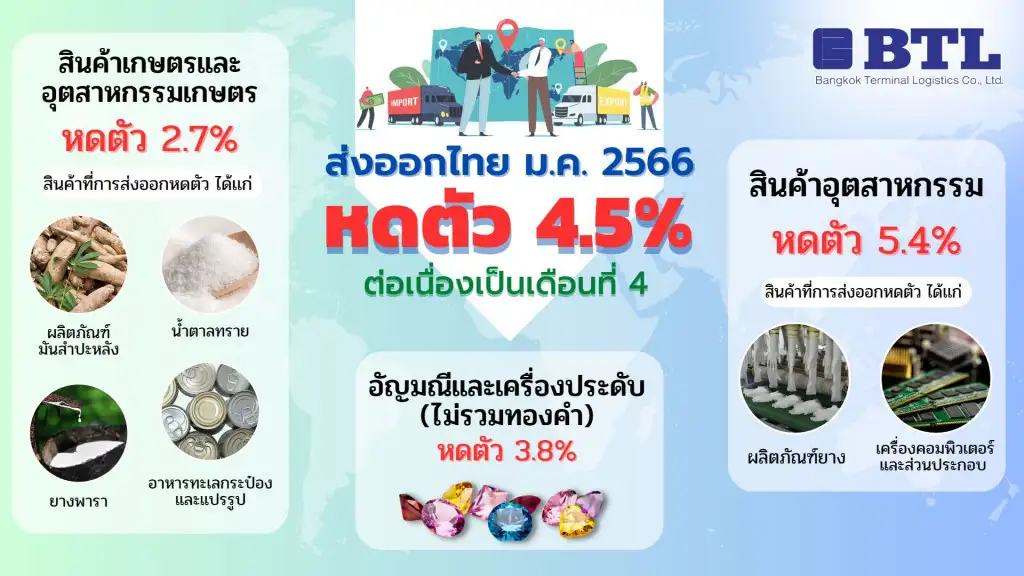



Thai export figures for January 2023 were valued at 20,249.5 million US dollars, a contraction of 4.5% compared to the same month of the previous year.
March 2, 2023, Mr. Sinit Lertkrai, Deputy Minister of Commerce, revealed Thailand’s export figures for January 2023, with a value of 20,249.5 million US dollars, a contraction of 4.5% compared to the same month of the previous year. This is the fourth consecutive month of contraction since October 2022.
Excluding oil-related goods, gold and military equipment, which contracted by 3.0%, Thai exports contracted less than the previous month, but were still at a better level than many countries in Asia.
Many of Thailand’s export markets have returned to expansion, including the European Union, Latin America, India, Africa, and ASEAN (5), amidst the impact of the slowdown in the global economy and the volatility of the baht, while imports were valued at 24,899.1 million US dollars, expanding by 5.5%, resulting in a trade deficit of 4,649.6 million US dollars for Thailand.
Thai exports 2023, agricultural products and agro-industrial products, contracted by 2.7%.
Compared to the same period last year, it has continued to contract for 4 months.
But there are still important products that are expanding well, including:
Products that Thai exports in 2023 contracted include:
Industrial product exports contracted by 5.4%.
Compared to the same period last year, it has continued to contract for 4 months.
But there are still important products that are expanding well, including:
Products that Thai exports in 2023 contracted include:
Gems and jewelry (excluding gold) contracted by 3.8%, continuing to contract for 2 months.
(Shrinking in Hong Kong, Germany, India, UK and Australia, but expanding in the US, Italy, Belgium, UAE and Japan)
However, the Ministry of Commerce has taken proactive and in-depth actions to promote and facilitate exports. Important operations in the past months to promote exports include:
– Suppression of smuggling of palm oil by land, which can still be imported by ship and sent abroad only at some checkpoints, to reduce the problem of low domestic palm oil prices due to illegal smuggling, resulting in reduced smuggling and better palm prices.
– Reviving the Thai-EU free trade negotiations with the goal of reducing tariffs between the two countries to 0%, with both parties agreeing to accelerate the approval of the negotiation process and procedures as soon as possible after the negotiations have been suspended since 2014, which will allow Thailand to export more goods to the 27-nation European Union and gain more advantages compared to other competitors.
– Supporting local products to the world market, focusing on strengthening the grassroots economy, setting goals to promote local products under the Local + (Local Plus) approach, in 3 product groups: BCG group, Identity product group, and Innovative product group.
It will help in providing knowledge on production, product development and pushing it into the market both domestically and internationally to increase marketing channels for product manufacturers and generate income for the country.
Mr. Chaichan Charoensuk, President of the Thai National Shippers’ Council (TNSC) or the Exporters’ Council, revealed that Thailand’s exports in January contracted as a result of importing countries having inventories since the end of 2022.
In many product groups such as textiles, however, it is believed that Thai exports will return to positive growth in the second quarter, as seen from the expansion of food products, the problem of chip shortages has decreased, containers, and phase values are at levels before the impact of COVID.
Source of information: Prachachat Business
Contact us for BTL service inquiries
02-681-2005 to 9